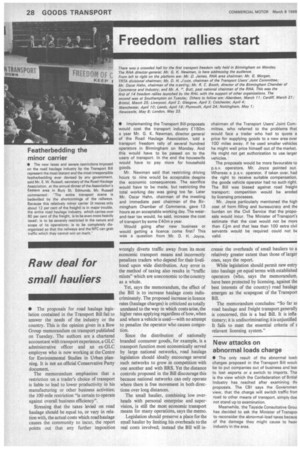Freedom rallies start
Page 30

If you've noticed an error in this article please click here to report it so we can fix it.
Featherbedding the minor carrier
• The new taxes and severe restrictions imposed on the road haulage industry by the Transport Bill represent the most blatant and the most irresponsible featherbedding ever devised by any government. said Mr. E. W. Russell, secretary of the Road Haulage Association, at the annual dinner of the Association's Eastern area in Bury St. Edmunds. Mr. Russell commented: "The entire transport scene is bedevilled by the shortcomings of the railways. Because this relatively minor carrier fit moves only about 12 per cent of the freight) is in major trouble, the entire road haulage industry, which carries over 80 per cent of the freight, is to be even more heavily taxed; is to be severely restricted in the nature and scope of its operations: is to be completely disorganized so that the railways and the NEC can grab traffic which they cannot win on merit. • Implementing the Transport Bill proposals would cost the transport industry -Et 50m a year Mr. G. K. Newman, director general of the Road Haulage Association, told a transport freedom rally of several hundred operators in Birmingham on Monday. And this would have to be passed on to the users of transport. In the end the housewife would have to pay more for household goods.
Mr. Newman said that restricting driving hours to nine would be acceptable despite the economic consequences. The sacrifice would have to be made, but restricting the total working day was going too far. Later Mr. Oscar Hahn, chairman of the meeting and immediate past chairman of the Birmingham Chamber of Commerce, gave 13 hours as an acceptable working day. The wearand-tear tax would, he said, increase the cost of transport by some E40m a year.
Would going after new business or would getting a licence come first? This was a question from Mr. D. H, Joyce, chairman of the Transport Users' Joint Committee. who referred to the problems that would face a trader who had to quote a price for supplying goods to a new area over 100 miles away. If he used smaller vehicles he might well price himself out of the market. He might not get authorization to use larger vehicles.
The proposals would be more favourable to p.s.v. operators. Mr. Joyce pointed out. Whereas a p.s.v. operator, if taken over, had the right to receive suitable compensation. the goods vehicle operator had no such right. The Bill was biased against road freight transport: competition would be eroded by licensing processes.
Mr. Joyce particularly mentioned the high cost of form filling and bureaucracy and the burden on the Civil Service that the proposals would incur. The Minister of Transport's estimate that the cost would not be more than Ei-m and that less than 100 extra civil servants would be required could not be valid.




































































































































